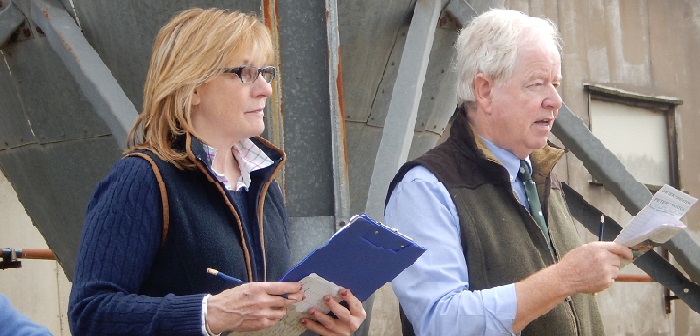Not a great deal of Christmas spirit in the air as far as pig prices are concerned with the SPP continuing its downward drift, losing another 1.20p to stand at 152.04p which by coincidence is almost exactly the same as it was worth 12 months’ earlier.
Weekly contribution prices lost a copper in places and are mainly in the 143-145p range, and spot bacon also generally traded at similar levels to last week, around 140p/kg for one off loads but regular sellers were generally 2-4p ahead of this.
One slightly comforting note was that the influential German producer price has held at 1.45 EUR/kg for the 7th week running, but when converted to sterling works out at 126p which is still way below equivalent UK pig prices and helps to explain why there seems to be so much downward pressure on our pig meat values from cheaper imports.
Cull sow prices are also in retreat, mainly due to a much stronger £ following news that it looks as though the Brexit show is back on the road especially as far as the Irish border crossings are concerned. But as a result cull sows lost around 2p/kg in value and are now struggling to hit the 70p mark compared with 93p/kg this time last year with the Euro trading at 87.6p on Friday afternoon compared with 88.1p seven days ago.
The gap between spot and contract weaner prices continues to widen despite sharp falls in AHDB values which saw the latest 30kg ex farm average drop by £3.15/head to £52.92/head and 7kg values also eased by £1.09/head to £40.16/head.
However, with most contract weaner prices tied to the slow moving SPP, it will be some while before these fall to the levels of spot trades, which are reported to be up to £10/head less than contract prices with space remaining limited.
Grain market prices ended another relatively quiet week with UK ex farm feed wheat traded on a spot basis at £135/t region and futures values on the LIFFE market saw January feed wheat trade at £138.05/t, March at £140.65/t and July at £143.80/t
Global grain markets showed very little movement with some small declines for UK and Chicago wheat futures but with no significant currency or crop news to report, the market continues to lack direction.
And finally more slightly worrying news for us to ponder over the Christmas break, with the latest report that the four largest global pork exporters, including Brazil, Canada, the US and the EU, have seen the average value of pork fall by 4% between July and September this year. This trend is more than highlighted by the recent collapse in cull sow values which can be seen as a rough and ready barometer of the fortunes or otherwise of the pig meat industry.
Added to this, the recent news that Russia has banned the import of Brazilian pig meat due to concerns over the presence of a muscle growth stimulant, Ractopamine.
This means that Brazilian pig meat could be looking for homes elsewhere and put further downward pressure on the market at a time when the Russian pork industry is looking to step up production and become more self-sufficient following on from the embargo against agri-food products which for political reasons was implemented way back in August 2014.




